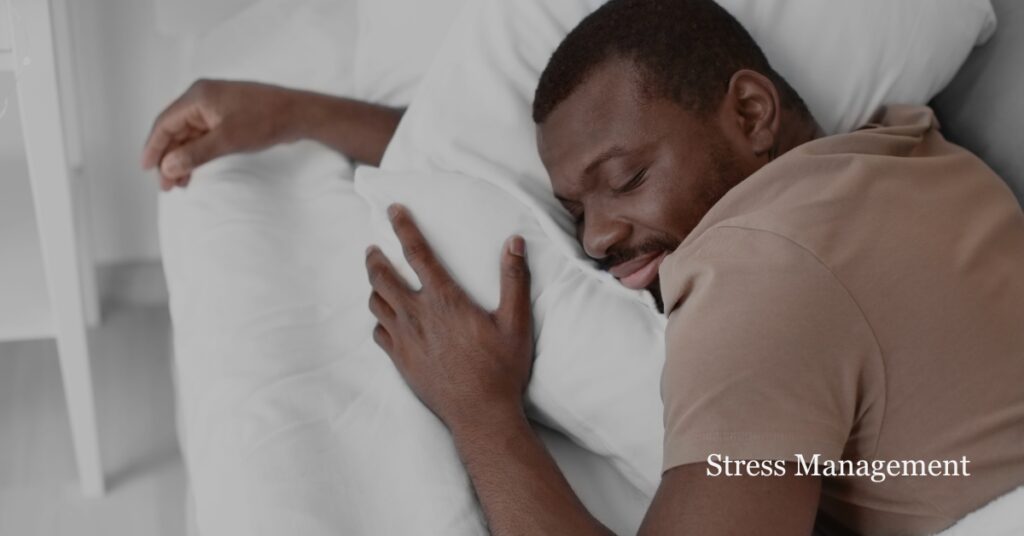As a therapist, one of the first things I ask my clients when they come in feeling overwhelmed, anxious, or low in energy is: How are you sleeping?
Because here’s the truth—sleep and mental health are deeply connected. It’s not just about getting enough hours of rest (though that helps!). The quality of your sleep can have a huge impact on how you feel emotionally, mentally, and even physically throughout the day.

What is the Connection Between Sleep and Mental Health?
The link between sleep and mental health goes both ways. Poor sleep can worsen mental health conditions, and mental health struggles can make it harder to fall or stay asleep. It can become a vicious cycle.
Research consistently shows that individuals with sleep disturbances are more likely to experience symptoms of anxiety, depression, and other mental health disorders. In fact, up to 90% of people with depression also report sleep issues, according to the Sleep Foundation.
Even one night of disrupted sleep can affect your mood, decision-making, and ability to cope with stress.
Does Sleep Affect Mental Health?
Absolutely. Sleep is like a reset button for your brain and nervous system. During deep sleep, your brain processes emotional experiences, regulates hormones, and restores balance in areas of the brain responsible for focus and emotional regulation.
When sleep is consistently disrupted, you may notice:
- Increased irritability or mood swings
- Difficulty concentrating
- Heightened anxiety
- Low motivation or energy
- A lower threshold for stress
Absolutely. Sleep is like a reset button for your brain and nervous system. During deep sleep, your brain processes emotional experiences, regulates hormones, and restores balance in areas of the brain responsible for focus and emotional regulation.
When sleep is consistently disrupted, you may notice:
- Increased irritability or mood swings
- Difficulty concentrating
- Heightened anxiety
- Low motivation or energy
- A lower threshold for stress
It’s not just feeling tired—it’s feeling dysregulated, unbalanced, and disconnected from your usual coping skills.
Take Jess, for example—a young professional and full-time grad student. At first, she started staying up late to finish coursework and scroll through her phone to wind down. But after a few weeks of sleeping just 4–5 hours a night, she began snapping at her partner, skipping meals, and zoning out during meetings. Tasks that once felt manageable now felt overwhelming. She was anxious, forgetful, and constantly on edge.
Jess didn’t connect the dots right away, but sleep deprivation was at the core of her burnout. Once she began prioritizing rest—creating a consistent sleep routine and cutting back on late-night screen time—she noticed a shift. Her emotions felt more stable, her focus returned, and she finally felt like herself again.
This is the snowball effect of poor sleep. It doesn’t just affect your energy—it quietly chips away at your emotional resilience, your ability to think clearly, and your sense of balance. That’s why quality sleep isn’t a luxury—it’s a foundation for good mental health.
Can Lack of Sleep Cause Mental Disorders?
Chronic sleep deprivation doesn’t just impact your mood—it can significantly increase the risk of developing mental health disorders. Studies suggest that long-term sleep problems may play a role in the onset of anxiety disorders, depression, and even bipolar disorder.
For some, insomnia isn’t just a symptom—it can be an early warning sign of a deeper mental health concern.
Sleep and Mental Health Statistics
Let’s take a look at the numbers:
- Nearly 1 in 3 adults in the U.S. report that they don’t get enough sleep.
- Individuals with insomnia are 10x more likely to have clinical depression and 17x more likely to struggle with anxiety.
- People who sleep fewer than 6 hours a night are significantly more likely to experience psychological distress than those who sleep 7–8 hours.
These stats reinforce what many of us already know from experience—when your sleep suffers, your mental health does too.
Mental Health Benefits of Quality Sleep
Getting good sleep—both in duration and quality—offers incredible mental health benefits, including:
- More emotional stability and resilience
- Improved focus and decision-making
- Better stress tolerance
- Enhanced memory and cognitive performance
- Reduced symptoms of anxiety and depression
In short: good sleep and mental health go hand in hand.
How to Improve Sleep for Better Mental Health
If you’re struggling with sleep, here are some therapist-approved strategies to help reset your routine:
1. Stick to a Sleep Schedule
Try to go to bed and wake up at the same time every day—even on weekends. A consistent routine helps regulate your circadian rhythm.
2. Limit Screens Before Bed
Blue light can interfere with your brain’s production of melatonin, the hormone that signals sleep. Shut off screens at least 30–60 minutes before bed if you can.
3. Create a Wind-Down Routine
This might include dimming the lights, doing a few stretches, sipping herbal tea, or reading something light. The goal is to cue your body that it’s time to slow down.
4. Journal Before Bed
If racing thoughts are keeping you up, try a quick brain dump or worry journal before turning in. Writing can be a powerful way to quiet your mind.
5. Seek Professional Support
If your sleep problems are chronic or impacting your daily life, therapy can help. Cognitive Behavioral Therapy for Insomnia (CBT-I) is a proven treatment for improving sleep and reducing the mental health symptoms that go along with it.
Final Thoughts from a Therapist
If you’re not sleeping well, please don’t write it off as “just stress” or “not a big deal.” Sleep is one of the most foundational components of mental wellness. It’s not just about rest—it’s about healing, resilience, and emotional regulation.
The connection between sleep and mental health is strong and backed by science. And the good news? Even small shifts in your routine can have a big impact.
If you’re ready to explore the root causes of your sleep struggles—or how anxiety, depression, or ADHD might be affecting your rest—working with a therapist can help you get to the heart of what’s going on.
You deserve rest. And you deserve support.
